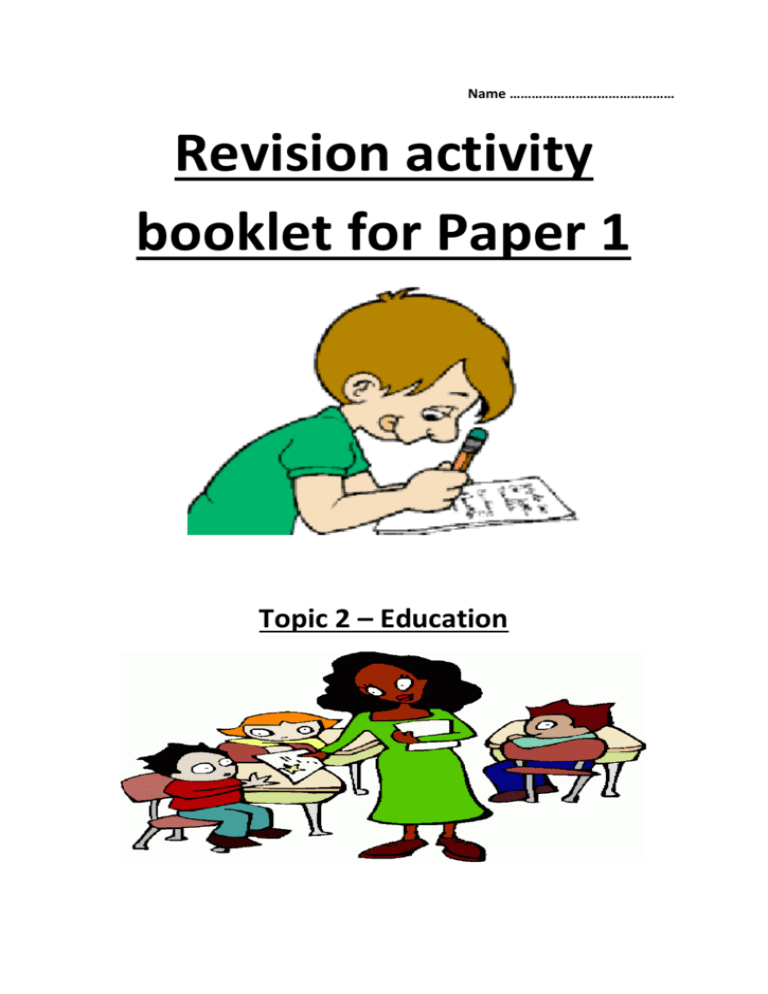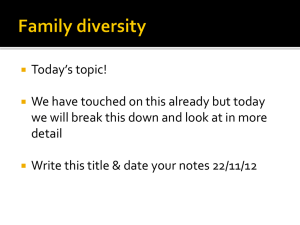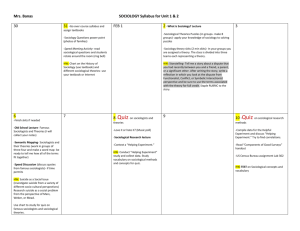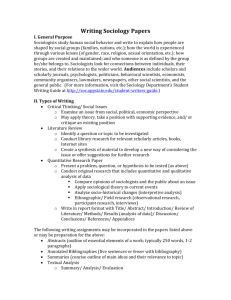Education
advertisement

Name ……………………………………… Revision activity booklet for Paper 1 Topic 2 – Education Education What is the role of education in modern Britain? What do functionalists say the role of education is (these are positive reasons)? What do Marxists say the role of education is (these are negative reasons)? What is the hidden curriculum? How has the British education system changed over the last 50 years? How did the Grammar School system introduced in 1944 work? How did the Comprehensive system introduced in 1965 work? What were the main changes introduced by the 1988 Education Act? What changes have New Labour made to the Education system? What is the structure of the British education system today? What in school factors affect educational achievement? How does the hidden curriculum work? What impact do streaming and setting have? What are labelling and the self fulfilling prophecy? How do subcultures affect achievement? How does social class affect educational achievement? What impact does home environment have on achievement? What is cultural capital? How might teachers label working class pupils? What impact could the rising cost of higher education have on working class students? How does gender affect educational achievement? Why have girls done better than boys in education in the last 20 years? Why have boys done worse than girls in education over the last 20 years? Why do boys and girls pick different subjects in school? How does ethnicity affect educational achievement? Green Amber Red Why do some ethnic groups do better in education than others? Why might cultural differences explain these different levels of achievement? What in school factors could lead to students from ethnic minorities doing less well? Contemporary examples Why is education a political issue? What criticisms have been made of recent government education reforms? What debates are there around faith schools, testing special needs and alternative forms of provision as a social issue? Can you give 3 recent examples from the news that relate to anything above? Specialist key terms glossary Academies Anti-school subculture Citizenship Comprehensive school system Cultural capital De-schooling Formal curriculum Ethnocentric curriculum Free schools Further/higher education Hidden curriculum Home education Independent sector schools Inclusion and exclusion Labelling Marketisation of education Material deprivation Meritocracy Mixed ability classes National curriculum Official curriculum Ofsted Private schools Public school SATs Selective schooling Tripartite system Self-fulfilling prophecy Setting and streaming School league tables State funded schools Specialist schools Vocational education What are the economic and selective roles of education? Education can be seen to play an economic and selective role in society. Functionalist perspectives see these as positive and of benefit to the whole society. Marxist perspectives see education as having a beneficial role for privileged groups in society and reinforcing existing inequalities. What are the socialisation, social control and political roles of education? The education system has a role in socialising, controlling and politically education people in society. Functionalist perspectives see these roles as positive and of benefit to the whole society. Marxist perspectives see education as having beneficial role for privileged groups in society and reinforcing existing inequalities. What is learned through formal and informal education? The education system provides both formal and informal learning to students. This learning takes place through the official curriculum What changes took place in Britain’s education system up to 1965? A formal education system began in Britain in 1870, linking the state to educational provision. This was developed further by the tripartite system, which aimed to allocate students toschools based on their academic ability. What is the comprehensive system? The comprehensive system was introduced to allow all students, regardless of academic ability, equality of opportunity by attending the same type of school. However, whether this has happened in every case has been questioned. How is the educational system organized in contemporary Britain? In Britain, most primary education is provided by the state through LAs. Most secondary education comes through state comprehensive schools. There is also provision through the independent sector where fees are paid. A range of provision exists beyond compulsory education and there is an emphasis on remaining in education or training after the age of 16. Should education be provided by the state or by the independent sector? Currently, Britain has a mixture of state independent provision, with the majority if children attending state schools. Both forms of provision can be seen to have advantages and disadvantages. What is vocational education and alternative forms of provision? Over the years, vocational education has been seen by governments as an increasingly important way of ensuring a more effective workforce to meet needs of the economy. Some alternative forms of educational provision do exist in Britain. What have been the effects of marketisation, the National Curriculum and testing? Market forces have become part of the education system through parental choice and competition. The National Curriculum has resulted in compulsory core subjects for all and testing at different key stages. How have freedom and choice increased? Schools and colleges must now publish a prospectus and results, providing parents with more information on which to base choices. A greater diversity of school provision includes CTCs and foundation schools. Governing bodies have been given greater freedom through local management of schools. What are school league tables? The introduction to league tables have created more competition and provided more information to parents. However, critics suggest they may have led to a reduction in educational opportunities for some. How has educational policy developed since 1997? A wide range of policies since 1997 have focused on raising standards, reducing inequalities and promoting diversity and choice in education. How can social class affect achievement? Sociological explanations for differences in achievement mainly focus on the social environment. Social class is a key factor here, with students from high social class backgrounds having a greater chance of achieving high qualifications. How can material factors affect achievement? The concept of material deprivation suggests that children from more privileged backgrounds in general have better material facilities in the home. How can parental attitudes affect achievement? Middle-class and working-class parents are argued to have different values and expectations regarding education. Middle-class values may lead children to fit in better with the school environment, while working-class children may be culturally deprived. How might the school affect achievement? Processes within the school may be influential on students’ achievements. Teachers may label students and this may lead to a self-fulfilling prophecy. These labels can be positive or negative and students can accept them or attempt to reject them. What is the influence of streaming subculture and school organization? Streaming in schools can have both a positive and a negative influence on students’ achievements. Some students may become part of a counter-school subculture which may affect their achievement. They way in which school is organized may have some effect in reducing the influence of social class differences in achievement. Why has achievement for females improved? Although achievement levels for both males and females have improved, female achievement levels are higher overall. A range of factors in both the education system and the wider society can be identified to help explain this pattern. How can we explain differences in subject choice between males and females? Differences exist tin subject choices between males and females- particularly in post- 16 education. These differences may be related to influences from home, the wider society or from within the education system. Single-sex schools and classrooms have been identified as a possible way of addressing these differences as well as to raise achievement generally. Why is the performance of female students improving faster than that of male students? Although achievement levels for males are increasing overall, they appear to be under-performing compared with female students. A number of factors have been linked to this pattern. These relate to the influence of males’ own attitudes to studying, changes in the wider society in terms of traditional male roles. What are the patterns of ethnicity and achievement? Statistics show different levels of achievement for different ethnic groups. Research suggests that IQ is not a major factor and that other factors relating to social background may be most influential on achievement levels. Are social class and cultural factors influence? Various explanations have been given relating to cultural differences. However, social class background and gender also seem influential, suggesting that explanations relating to these two factors are also relevant. What is the role of the school in ethnicity and achievement? The concept of labelling can be used to explain some teacher’s attitudes to different ethnic groups. This made more complex by differences in labels relating to gender. Also, labels may vary between ethnic groups. The hidden curriculum may also present stereotypical images of some groups. How might discrimination and a lack of black teachers be important? There are variations in achievement levels for different ethnic groups. Discrimination and racism in education may affect student achievement. A lack of teachers from ethnic minority groups may also be influential. There are also variations in achievement within the ethnic groups related to social class, background and gender. It is important not to assume the members of a particular classified group all share the same attitudes, values and experiences. How to answer 4 mark questions The pattern of these questions is: Explain what sociologists mean by……….. EG “Explain what sociologists mean by labelling.” Sometimes the question may add when studying…… EG “Explain what sociologists mean by conformity when studying education.” The marks are allocated as follows: 1 mark for basic statements about the question with little or no reference to the topic that the question’s set on. 2-3 marks for a partial or under-developed sociological explanation, possibly via an example, in which some general reference will be made to the topic that the question is set on. 4 marks for a clear explanation focused on the topic that the question is set on that uses examples from specifically relevant areas of sociology How to start your answer: In the context of (insert name of topic), (keyword) means……… EXPLAIN THE PROCESS EXAMPLE DEFINITION IN CONTEXT Example: Family section: Explain what sociologists mean by patriarchy. (4 marks) In the context of thefamily, patriarchy means For example…. This happens because… Past exam questions for topic 2 – education 4 marks question Jan 12 Explain what sociologists mean by a faith school. (4 marks) June 12 Explain what sociologists mean by the self-fulfilling prophecy. (4 marks) Jan 12 Explain what sociologists mean by pupil subcultures. (4 marks) June 11 Explain what sociologists mean by vocationalism in education. (4 marks) Jan 11 Explain what sociologists mean by labelling in schools. (4 marks) June 10 Explain what sociologists mean by the hidden curriculum. (4 marks) How to answer 5 Mark questions DON’T FORGET: underline / highlight the key words in the question and then use them in your answer. EG: Describe one way in which gender roles in the family have changed in the past 50yearsand explain why this change has happened. DESCRIBE one way in which gender roles in the family have changed in the past 50 years is NEW PARAGRAPH EXPLAIN this change has happened because Mark scheme: Describe one: 2 marks 1 mark for a partial description. 2 marks for an appropriate and more developed description Explain: 3 marks description. 1-2 marks for a simple explanation linked to the 3 marks for a clear explanation explicitly related to the description AND relevant sociological theory / concepts. Past exam questions for topic 2 – education 5 marks questions Jan 13A Describe one way in which schools put pupils into groups and explain how this mayaffect a pupil’s educational achievement. (5 marks) Jan 13b Describe one government policy of the past 25 years which has attempted to improveeducational standards and explain how successful this policy has been.(5 marks) June 12A Describe one way in which a school’s performance is measured and explain how thismay or may not be a good way of measuring the standards of a school. (5 marks) June 12B Describe one function that education may perform for society and explain how this maybenefit society.(5 marks) Jan 12A Describe one way in which teacher expectations can affect attainment and explain howthis may or may not lead to an improvement in educational achievement. (5 marks) Jan12B Describe one way in which a personal tutor or mentor can try to raise individual pupil performance and explain how this may lead to an improvement in educational achievement. (5 marks) June 11 A Describeone way in which schools attempt to encourage a sense of what it means to beBritish and explain how this may help to improve social cohesion. (5 marks) June 11B Describe one government policy of the last 20 years which has attempted to widen therange of young people participating in post-16 education. Explain how this policy may or may not have increased educational opportunities. (5 marks) Jan 11A Describe one way in which a school can try to raise pupil performance and explain how this may lead to an improvement in educational achievement. (5 marks) Jan 11B Describe one government educational reform of the last 25 years and explain how thismay have increased or decreased educational opportunities. (5 marks) June 10 ADescribeone way in which parents can assist their children to achieve well at schooland explain how this would help. (5 marks) June 10 B Describeone way in which governments have attempted to check what happens inschools and explain what effect such monitoring may have on a school. (5 marks) PEELing apart your essay For your question, identify at least three points – there must be at least ONE in each column. Sociologists WOULD agree Sociologists WOULD NOT agree Introductions Use the question at the beginning of your introduction for example; Use the words from the question as a starter to your first sentence How far Sociologists would agree that marriage in Britain today is important is debateable because Or How far sociologists would agree that the type of school a child attends has a significant effect on his or her life chances is debatable because Use the introduction to break down what the question is asking you; Define any key terms it mentions – EG “life chances” Is there a theory it is talking about – EG Marxism / Functionalism / New Right If statistics are involved, what is the key trend or pattern in this area? – EG Rising / Falling / Steady / High / low Pointless picture of a banana (teacher joke) Now PEEL the question apart You need to do the following for EACH of your 4 points POINT theory or concept EXPLAIN what do sociologists think about this? EXAMPLE evidence from stats or a relevant example from real life LINK Is there a theory that can be linked? to the question and next paragraph Conclusion starters Your conclusion should address the essay question directly (weigh up all the evidence/theories) and answer the ‘How far.’ part. E.g To a large/a small / some extent sociologists agree because... To sum up it would appear that many/some sociologists agree/disagree… In conclusion it would seem that most/few sociologists agree/disagree… Mention any statistics that support your conclusion Mark 1-3 4-6 7-9 10-12 Knowledge and understanding Basic statements with little sociology Some understanding of relevant sociology “How far” (Evaluation) Sociological terms Spelling / punctuation no response very limited range poor no response limited range used appropriately. some accuracy. More developed understanding of relevant sociology Clear understandingunderstanding of relevant sociology recognises ‘how far’. A good range used effectively. reasonable accuracy. Explicitly and in detail addresses ‘how far’ awide range used very effectively. considerable accuracy Use the mark scheme to assess how well you’re doing… New specimen Discuss how far sociologists would agree that encouraging pupils to adopt British values has become in recent years the most important function of the education system. (12 marks) Sociologists WOULD agree Sociologists WOULD NOT agree Discuss how far sociologists would agree that parental attitudes are the most important influence on a child’s educational achievement. (12 marks) Sociologists WOULD agree Sociologists WOULD NOT agree June 2010 Discuss how far sociologists would agree that educational reforms over the last 25 years have been successful in raising the achievement of all pupils. (12 marks) Sociologists WOULD agree Sociologists WOULD NOT agree Discuss how far sociologists would agree that the situation in a pupil’s home is a more important cause of educational under-achievement than the type of school he or she attends. (12 marks) Sociologists WOULD agree Sociologists WOULD NOT agree June 2011 Discuss how far sociologists would agree that a student’s ethnic background is the main reason for differences in educational achievement. (12 marks) Sociologists WOULD agree Sociologists WOULD NOT agree Discuss how far sociologists would agree that peer group pressure has a significanteffect on a student’s choice of subjects at school and of courses at college. (12 marks) Sociologists WOULD agree Sociologists WOULD NOT agree Jan 2011 Discuss how far sociologists would agree that the way in which pupils are grouped within a school has a significant effect on their educational performance. (12 marks) Sociologists WOULD agree Sociologists WOULD NOT agree Discuss how far sociologists would agree that the main function of schools is to teach children to become part of society. (12 marks) Sociologists WOULD agree Sociologists WOULD NOT agree Jan 2013 Discuss how far sociologists would agree that a pupil’s social class background is the main reason for differences in educational achievement. (12 marks) Sociologists WOULD agree Sociologists WOULD NOT agree Discuss how far sociologists would agree that the type of school a child attends has a significant effect on his/her life chances. (12 marks) Sociologists WOULD agree Sociologists WOULD NOT agree








